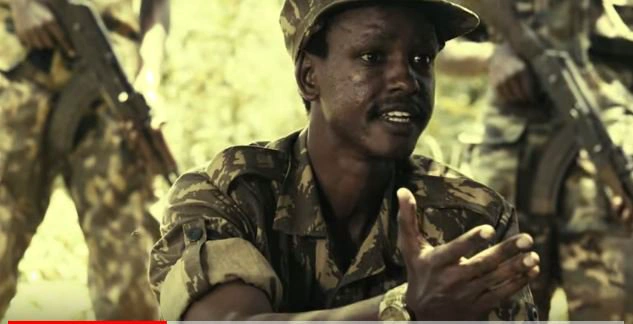For many young Ugandans, the five-year bush war that brought President Museveni to power is a distant, almost abstract chapter in history. But for actor Arnold Mubangizi, that war became the turning point of his life—both on and off screen. In 2018, Mubangizi starred in 27 Guns, a biopic that portrayed the early days of the National Resistance Army. He played a young Museveni, earning praise for his performance and briefly capturing the nation’s attention.
But seven years later, Mubangizi’s reality paints a far different picture. Once hailed as a rising star, he now lives in a cramped, single-room dwelling in Munyonyo, sharing the space with his ailing mother. The room is cluttered, dim, and humble. His mother sleeps on the only bed. Mubangizi rests on a mattress on the floor, the black bedsheet beneath him symbolizing more than just poor decor—it reflects a life darkened by neglect, misunderstanding, and economic hardship.
“After 27 Guns came out, things started falling apart,” he says. Rather than opening doors in the film industry, the role left him isolated and misunderstood. Many Ugandans viewed the film through a political lens rather than appreciating it as a piece of art. “People were tired of the government,” Mubangizi explains, “and because I portrayed Mzee [Museveni], they thought I was part of the system.”
At the time, he lived in Kireka. At first, he was treated with admiration. But that soon turned to suspicion and hostility. “They called me a spy,” he says. “Some even accused me of misusing public funds. Yet I was broke, just like everyone else.” The online abuse became so intense that he left social media entirely. Offline, the backlash turned physical. In 2019, after NBS TV broadcast the movie, he was attacked after a football match. “They thought I was pretending to be poor. One grabbed me by the neck, another hit me until I started bleeding,” he recalls.
The beating didn’t just leave physical scars. It triggered a series of misfortunes. His mother, a former screen actress, suffered a stroke shortly after the attack. The family’s life spiraled into crisis. He turned to alcohol to escape his thoughts. “I wanted to end it all. I tried hanging myself, I tried slitting my wrists. The depression nearly consumed me.”
He received Shs10 million for his role in 27 Guns. After paying Shs2 million to the casting director, the remainder wasn’t enough to change his circumstances. He bought a small plot of land in Mukono and planned to build a home. But the COVID-19 pandemic derailed those plans. His mother’s medical emergency drained whatever little he had. Debts piled up. He eventually sold the land to cover rent and hospital bills. Today, he pays Shs400,000 monthly for the small room. He’s two months behind on rent and owes more than Shs5 million in total debts.
“When we need to go to the hospital, we sometimes don’t even have Shs1,000 for transport,” he says. “I borrow maize flour and beans just to get through the day.”
Over the years, Mubangizi has written letters and proposals seeking help from the President. None have been answered. He still believes that President Museveni once had a vision to support the film industry, and he hopes that vision can be revived. But for now, acting jobs remain elusive. His last role was in a 2022 film, Katera of the Punishment Island. Attempts to find work outside the industry have also failed. “Whenever people realize who I am, they treat me with suspicion or hatred. I once washed cars at a bay. Even there, people kept asking if I was Mzee’s son.”
Some filmmakers refuse to work with him, fearing the backlash. “They don’t want to risk their projects. Making films in Uganda is already hard. 27 Guns showed the potential of our industry, but it also brought fear,” he says. Many of his fellow actors are also struggling.
Since the film’s release, Mubangizi has only met President Museveni once, briefly at a state function in Ntungamo. “He recognized me and asked, ‘Where are you now?’ I said I needed a job. He told me he would call my group. That group was never called.”
When asked why he wants to meet the President again despite being paid for his role, Mubangizi becomes emotional. “This isn’t just about me. My mother is very ill. We live in one room. I want help. I want to serve my country. I also want to help bridge the gap between the youth and the government. I’ve lived in slums for years. I know what young people are going through.”
He says Uganda’s youth face a dark future, marred by unemployment, substance abuse, and a lack of opportunity. His own life reflects that. Mubangizi began acting at 16, after dropping out of school due to lack of fees. His mother introduced him to the industry, but his family history remains a mystery. “I don’t know my father. My mother has never told me who he is,” he says.
Despite the adversity, Mubangizi says he has found some peace in faith. “I gave my life to Christ. It stopped me from taking my own life. It gave me a purpose. But we’re storytellers, and it’s disheartening that our stories haven’t helped us live better lives.”
He recalls an encounter with the late Tamale Mirundi, who was advised to help him reach the President. “I found him alone in a bar, talking to himself. When he saw me, he shouted, ‘Mzee, I worked for you! What have you done for me?’ He wasn’t seeing me. He saw the character I played. I just walked away.”
For actors like Mubangizi, the inability of audiences to separate character from performer has led to a tragic paradox. His most successful role became the source of his downfall. Now, Mubangizi hopes that either the President will hear his plea, or that he can find work abroad doing manual labor.
Either way, he says, he just wants a chance to live with dignity, to care for his mother, and to tell stories that matter—without becoming the villain of someone else’s narrative.








